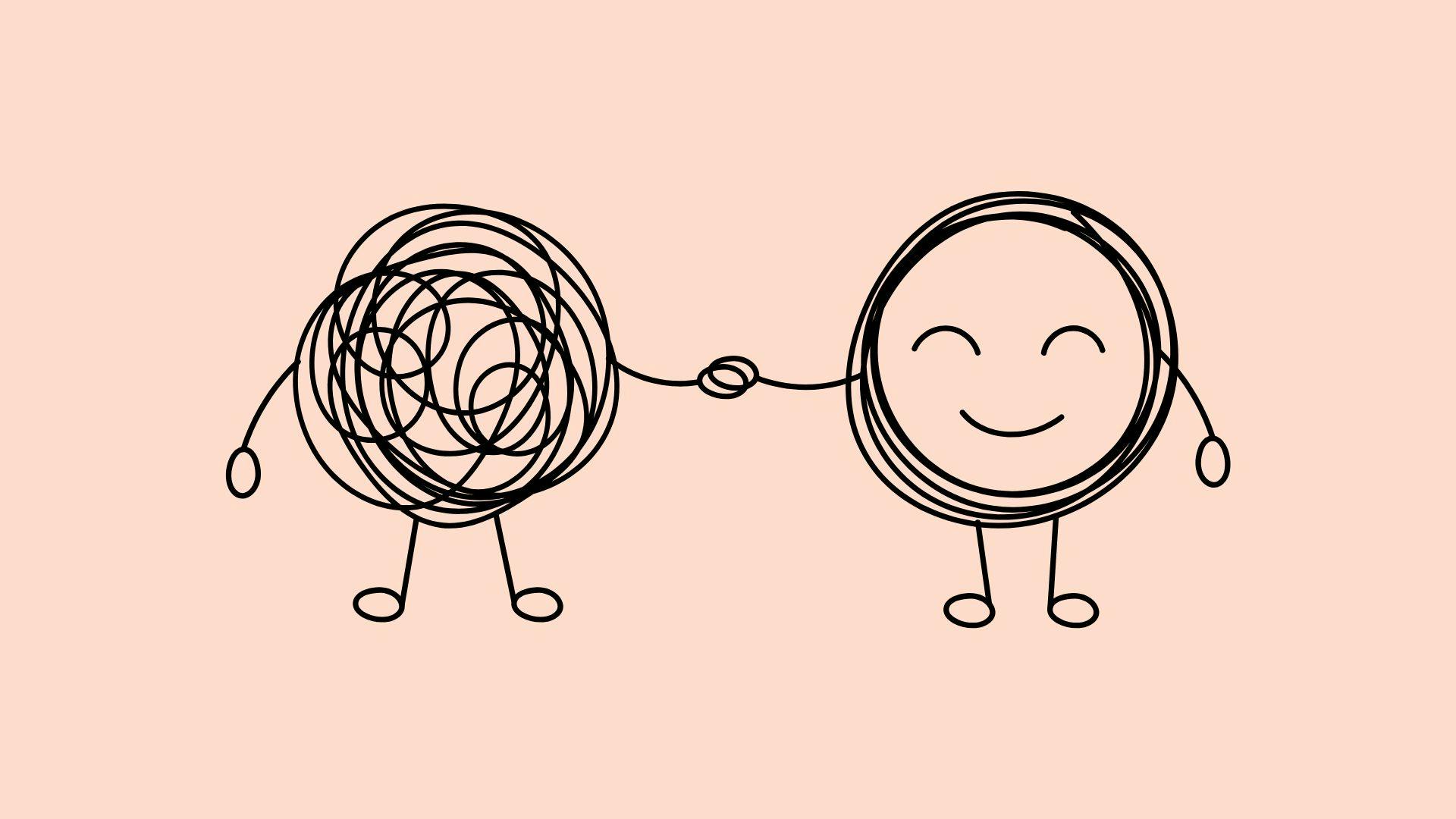Technology has transformed how mental health professionals deliver care and manage their practices. The right apps for mental health professionals can streamline documentation, improve client engagement, and reduce administrative burden.
This guide explores essential mental health apps across six key categories. You’ll discover which tools offer the best value for your practice size and specialty.
By the end, you’ll have a clear roadmap for building your ideal tech stack. We’ll help you prioritize investments and avoid costly mistakes.
Types of Apps Mental Health Professionals Need
The right apps for mental health professionals form six essential categories that address every aspect of modern practice management. These wellness apps and tools support both your daily workflow and your clients’ mental wellness journey.
Core Categories Overview
You’ll need apps across these fundamental areas:
- Documentation and note-taking apps - AI-powered tools like Supanote ($19.99-$69.99/month) and Mentalyc ($19.99-$69.99/month) that generate SOAP/DAP notes automatically. These apps help manage anxiety around documentation requirements while providing free time for client care.
- Practice management and scheduling - All-in-one platforms like SimplePractice or TherapyNotes that handle appointments, client portals, and administrative tasks. These tools connect your practice operations and reduce stress for healthcare professionals.
- Telehealth and secure communication - HIPAA-compliant video platforms like Doxy.me or integrated solutions within your EHR. These smartphone apps provide access to therapy sessions and support daily life continuity.
- Assessment and screening tools - Digital questionnaires and outcome measurement platforms built into major EHRs. These resources help track progress and identify mental health conditions effectively.
- Billing and insurance management - Automated claims processing and payment collection systems that support health care operations. Many apps in this category offer free basic features with premium upgrades.
- Professional development and continuing education - Apps for CE tracking and skill development that focus on wellness and treatment strategies for mental health clinicians.
Building Your Tech Stack
Start by prioritizing based on your practice size and immediate pain points. Solo practitioners often benefit most from documentation apps first, while group practices need robust scheduling and billing systems.
Integration matters more than individual features. Choose apps that communicate with each other or select comprehensive platforms that handle multiple functions.
Budget for 2-3 core tools initially, then expand. Most therapists spend $100-300 monthly on their complete tech stack, with documentation and practice management consuming the largest portions.
Documentation and Progress Notes Apps
Documentation apps for mental health professionals have evolved dramatically. AI-powered solutions now handle the bulk of note-taking work while you focus on client care and reduce stress.
AI-Powered Note Generation
Supanote
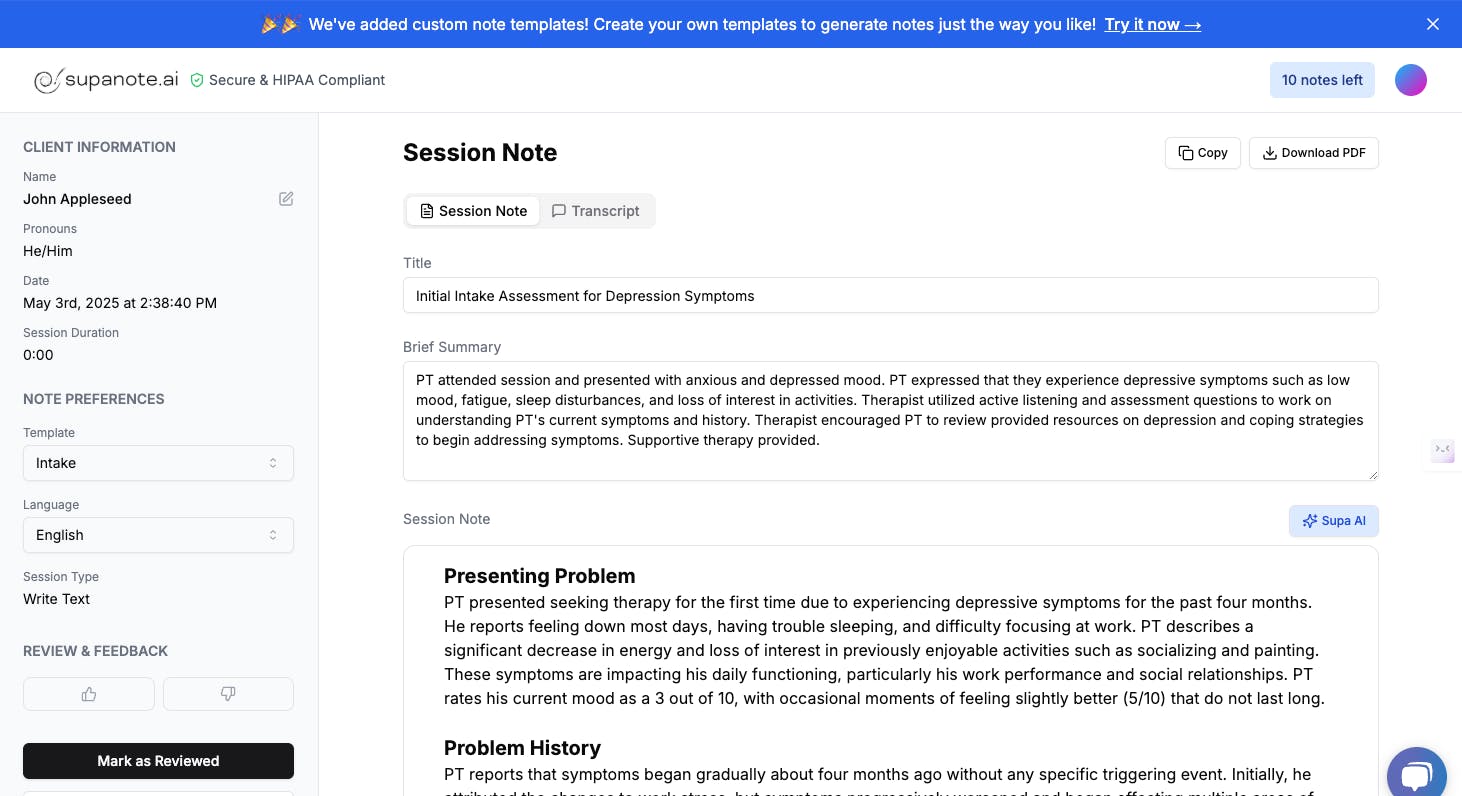
Supanote stands out as a purpose-built solution for mental health professionals, developed by healthcare professionals who understand clinical workflow demands.
- Native EHR integration eliminates double data entry
- Templates designed specifically for therapy sessions
- Automated compliance checking for documentation standards
- Smart suggestions based on session content that support progress tracking
Pricing: Basic plan at $29.99/month (40 notes), Professional at $49.99/month (100 notes), Premium at $89.99/month (unlimited notes)
Best suited for: Solo practitioners and small group practices prioritizing seamless EHR workflow
Mentalyc
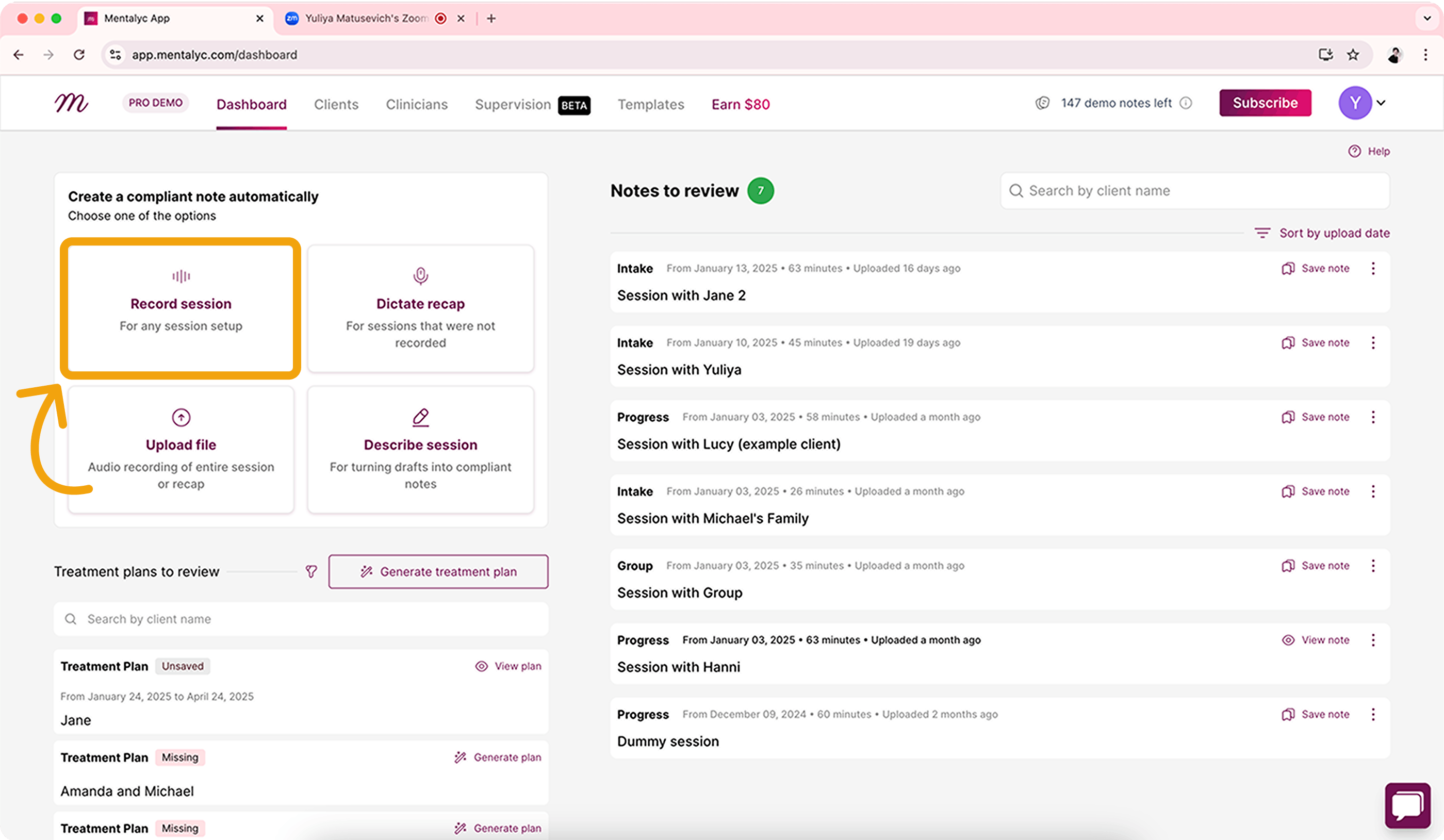
Mentalyc has gained popularity among adults seeking efficient documentation tools. It offers comprehensive template library and team-friendly features for mental health services.
- Pre-built SOAP and DAP note templates
- Treatment plan integration
- Team collaboration tools with shared templates
- Progress tracking across multiple sessions to manage symptoms
Pricing: Mini plan at $19.99/month (40 notes), Professional at $39.99/month (100 notes), Premium at $69.99/month (unlimited)
Best suited for: Group practices and clinicians who prefer structured documentation formats

Upheal
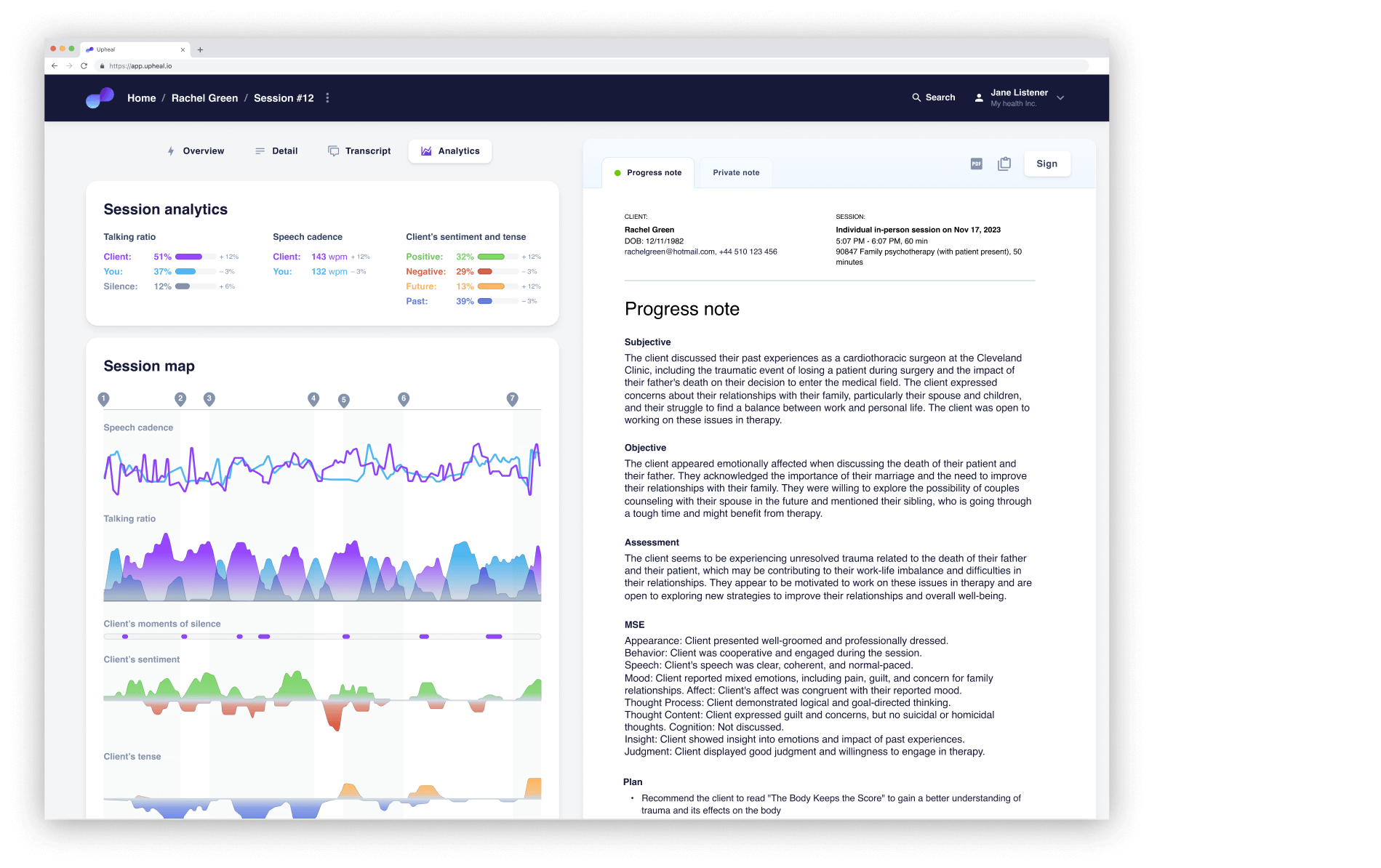
Upheal, offering exceptional value for remote therapy practices focused on mental wellness.
- Built-in secure video conferencing for mental health professionals
- Automatic session transcription and note creation supporting therapy workflows
- Real-time mood and sentiment analysis to track progress
- Permanent free tier with unlimited basic notes for apps users
Pricing: Free basic notes, Plus at $19/month, Premium at $35/month, Pro at $69/month
Best suited for: Telehealth-focused practices wanting an all-in-one solution for mental health services
Blueprint
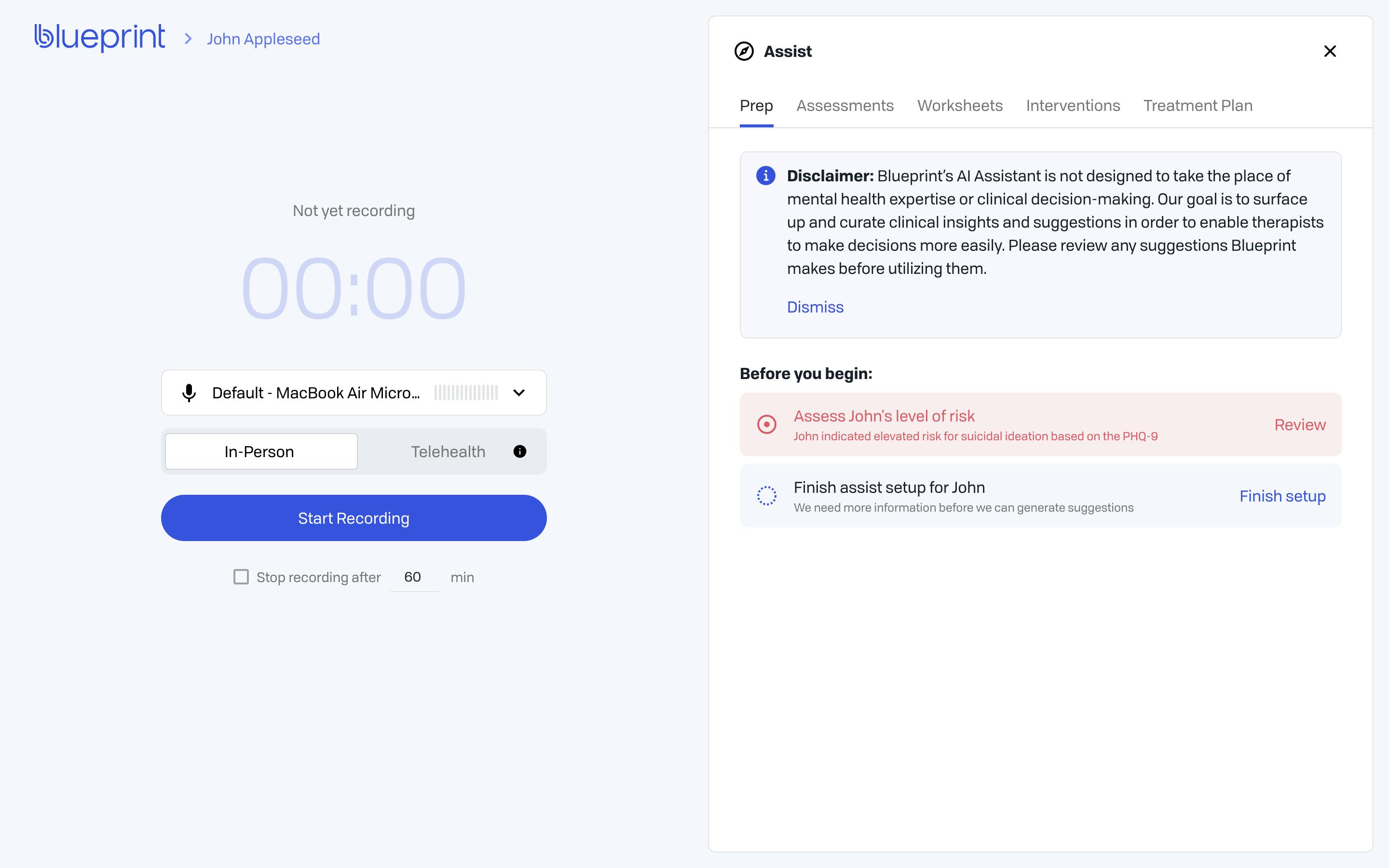
Blueprint uses a unique session-based pricing model that scales with your actual usage and helps manage treatment costs.
- Pay only for sessions you document
- Advanced AI that learns your documentation style and therapy approach
- Automatic billing code suggestions for health insurance portability
- Integration with major practice management systems
Pricing: Starting at $29/month with session-based billing
Best suited for: Variable-volume practices and part-time mental health clinicians
Traditional Documentation Tools
Quill Therapy Notes
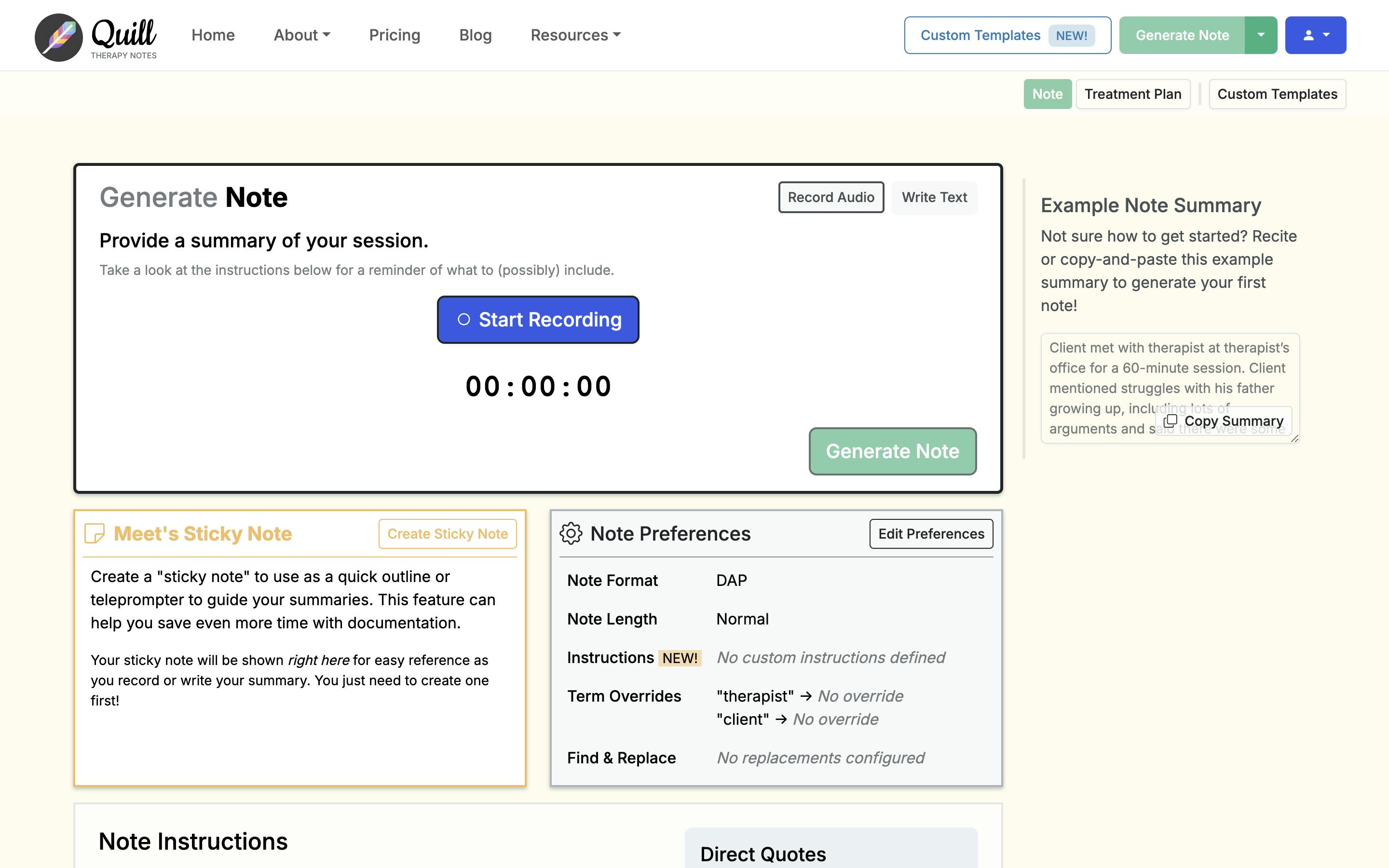
Quill Therapy Notes takes a summary-based approach without session recording, appealing to healthcare professionals concerned about privacy and security.
- Manual input with AI-assisted completion for therapy sessions
- No audio recording required for mental health apps
- Strong privacy protections for mental health conditions
- Unlimited notes at a flat rate
Pricing: $20/month for unlimited individual use
Best suited for: Privacy-conscious practitioners preferring manual input control in their daily life
Berries

Berries offers real-time session recording with multilingual support for diverse client populations dealing with various mental health issues.
- Live transcription during therapy sessions
- Multi-language processing capabilities for wellness apps
- Real-time note generation to improve sleep documentation efficiency
- Frequent promotional pricing for mental wellness tools
Pricing: $99/month after initial free sessions
Best suited for: Multilingual practices and mental health professionals serving diverse populations
What Makes Documentation Apps Effective
HIPAA compliance isn’t optional—verify that any mental health apps you consider meet all healthcare privacy requirements. Look for Business Associate Agreements (BAAs) and regular security audits to protect against self harm disclosures.
EHR integration eliminates duplicate work and reduces errors that can impact treatment outcomes. Tools that sync directly with your existing practice management system save significant administrative time.
Customization for your therapy modality matters when selecting apps for mental health professionals. CBT-focused practitioners need different templates than those doing psychodynamic work or managing anxiety disorders.
Balance time savings against accuracy needs in your wellness routine. While AI-generated notes save hours weekly, always review and edit for clinical accuracy and your personal documentation style.
Practice Management and Scheduling Apps
Your practice management system forms the backbone of your daily operations and overall mental wellness approach. The right tools can streamline everything from appointment scheduling to billing workflows while supporting better health outcomes.
All-in-One Practice Management Solutions
SimplePractice
SimplePractice is the most widely adopted practice management platform among therapists, offering comprehensive scheduling, billing, and client portal functionality for mental health professionals.
- Integrated telehealth capabilities for remote therapy access
- Automated appointment reminders to reduce stress on both clients and providers
- Insurance billing and claims management
- Customizable client intake forms for mental health conditions
Pricing: Starting at $39/month
Best suited for: Solo practitioners to medium-sized group practices
TherapyNotes
TherapyNotes is known for robust clinical documentation features alongside practice management tools that support comprehensive mental health services.
- Advanced progress note templates for therapy sessions
- Treatment plan integration for tracking depression and anxiety symptoms
- Comprehensive reporting features for wellness tracking
Pricing: Starting at $57/month
Best suited for: Clinically-focused practices requiring detailed documentation
Ensora Health (TheraNest)
Ensora Health (TheraNest) is a budget-conscious option without sacrificing essential features needed by health professionals.
- Full practice management suite with mental wellness focus
- Client portal and secure messaging for ongoing support
- Basic telehealth integration for accessible care
Pricing: Starting at $21/month
Best suited for: New practices or budget-conscious practitioners
Specialized Scheduling Tools
For practitioners who prefer dedicated scheduling solutions, Acuity Scheduling offers robust appointment management with client self-scheduling capabilities that improve access to mental health services.
about cancellation policies and emergency contact protocols.
Telehealth and Secure Communication Apps
Effective telehealth and secure communication apps for mental health professionals ensure HIPAA-compliant client interactions while maintaining therapeutic rapport through digital platforms.
Doxy.me – Simple, Browser-Based Telehealth Platform
Doxy.me is a straightforward telehealth platform that requires no downloads for clients, making it accessible for tech-hesitant populations.
- Browser-based access eliminates technology barriers
- Customizable waiting rooms with practice branding
- HIPAA-compliant with basic security features
- Free tier available with premium upgrades
Best suited for: Solo practitioners seeking simple, reliable video sessions
Zoom for Healthcare – Enterprise-Grade Telehealth Solution
Zoom for Healthcare offers an enterprise-grade telehealth solution with advanced features for larger practices.
- Enhanced security controls and administrative oversight
- Breakout rooms for group therapy sessions
- Recording capabilities with proper consent protocols
- Integration options with major EHR systems
Best suited for: Group practices and healthcare professionals requiring robust features
SimplePractice Telehealth
SimplePractice Telehealth is seamlessly integrated within the SimplePractice ecosystem for streamlined workflows.
- Direct scheduling integration from your calendar
- Automated session reminders and client notifications
- Built-in secure messaging through client portal
- Treatment notes accessible immediately post-session
Best suited for: Existing SimplePractice users wanting unified practice management
Secure Messaging Considerations
Most EHR systems include client portal messaging, eliminating the need for separate apps. Establish clear emergency contact protocols since secure messaging isn’t immediate.
Consider response time expectations and after-hours boundaries when implementing any messaging system.
Assessment and Screening Tools
Digital assessment platforms are transforming how you conduct screenings and track client outcomes throughout treatment.
Built-in EHR Assessments
Most major practice management systems now include standardized assessments like PHQ-9, GAD-7, and PCL-5. SimplePractice and TherapyNotes offer extensive assessment libraries that automatically score and integrate results into client records.
Specialized Population Tools
Dedicated platforms serve specific populations more effectively than generic tools. Consider specialized apps for adolescent screening, trauma assessments, or substance abuse evaluations that offer age-appropriate interfaces and targeted question sets.
Outcome Measurement Apps
Outcome tracking tools help demonstrate treatment effectiveness for health insurance and quality improvement. Many integrate directly with your EHR, sending automated reminders to clients and generating progress reports.
Integration Considerations
The most effective assessment tools sync seamlessly with your treatment planning process. Look for platforms that:
- Auto-populate assessment results into progress notes
- Generate visual charts for client review
- Send automated follow-up assessments based on treatment timelines
- Export data for outcome reporting requirements
Choose tools that fit your client demographics and treatment modalities rather than trying to use one-size-fits-all solutions.
Documentation and Note-Taking Apps Comparison
Here’s a quick comparison of the leading AI-powered documentation tools for mental health professionals:
Tool | Starting Price | Best Suited For |
|---|---|---|
Supanote | $29.99/month | Mental health practices needing native EHR integration |
Mentalyc | $19.99/month | Therapists wanting SOAP/DAP templates with team features |
Upheal | $19/month | Practitioners who need telehealth platform with note generation |
Blueprint | $29/month | Session-based practices preferring automated upgrades |
Quill Therapy Notes | $20/month | Therapists preferring summary-based notes without recording |
Berries | $99/month | Multi-language practices needing real-time session recording |
When choosing a documentation app, consider your specific practice needs, EHR integration requirements, and preferred workflow style. Most platforms offer free trials to help you evaluate fit before committing.
Assessment and Screening Tools (EHR-Integrated)
Here’s a quick comparison of built-in assessment tools within popular EHRs to help track client outcomes and support clinical decisions.
Tool | Starting Price | Best Suited For |
|---|---|---|
SimplePractice | $39/month | Solo practitioners to medium-sized group practices |
TherapyNotes | $57/month | Clinically-focused practices requiring detailed documentation |
TheraNest | $21/month | Budget-conscious or new practices |
Telehealth and Secure Communication Apps
Here’s a quick comparison of HIPAA-compliant telehealth apps that support secure virtual therapy sessions and client communication.
Tool | Starting Price | Best Suited For |
|---|---|---|
Doxy.me | Free (Premium $35/month) | Solo practitioners seeking simple, browser-based telehealth |
Zoom for Healthcare | Custom pricing | Group practices needing advanced telehealth with robust features |
SimplePractice Telehealth | Included in plan | Existing SimplePractice users wanting unified practice management |
How to Choose the Right Apps for Your Practice
Selecting the right apps for mental health professionals requires a strategic approach that goes beyond feature comparisons to consider your practice’s unique needs and implementation capacity.
Evaluation Criteria
Start by assessing your practice size and complexity. Solo practitioners need different mental health apps than group practices with multiple specialties.
A basic documentation app like Upheal (starting at free) might suffice for individual therapists, while larger practices may require comprehensive platforms like Supanote’s team plans.
Budget considerations should include ROI calculations for mental health technology. If an AI documentation tool saves you 30 minutes per day at a $150 hourly rate, a $99/month investment pays for itself within days.
Factor in integration requirements early – wellness apps that don’t connect with your existing EHR create workflow disruptions.
Implementation Strategy
Use a phased rollout approach rather than replacing everything simultaneously. Start with one core function like documentation, master it, then add scheduling or telehealth tools.
Plan staff training extensively for new mental health apps. Even user-friendly apps require adjustment time. Most platforms offer free trials – use this period for actual practice scenarios, not just feature testing.
Develop data migration and backup plans before switching systems. Ensure you can export client information and maintain access during transitions.
Cost-Benefit Analysis
Calculate time savings realistically when evaluating wellness apps. AI note-taking apps typically reduce documentation time by 60-80%, but factor in review and editing time.
Consider improved accuracy benefits – better notes support treatment continuity and reduce compliance risks.
Evaluate client satisfaction impact from mental health technology. Telehealth platforms and client portals often improve access and engagement, supporting retention and referrals.
Frequently Asked Questions
Q: How much should I budget for mental health apps annually?
A: Most solo practitioners spend $200-500 monthly on essential apps. This typically includes practice management, documentation, and telehealth tools. Group practices may spend $100-200 per clinician monthly depending on features needed.
Q: Are AI-powered documentation apps HIPAA compliant?
A: Reputable AI documentation apps like Supanote and Mentalyc are HIPAA compliant. Always verify the vendor has signed a Business Associate Agreement (BAA) before using any app. Review their security certifications and data handling practices regularly.
Q: Can I use many apps together, or should I choose an all-in-one solution?
A: Both approaches work depending on your needs. All-in-one solutions like SimplePractice offer convenience and integration. Specialized apps often provide better features but require more setup and potentially higher costs.
Q: What’s the biggest mistake therapists make when choosing apps?
A: Choosing apps based on features rather than actual workflow needs. Start by identifying your biggest time wasters and administrative challenges. Then find smartphone apps that specifically address those pain points rather than apps with the most features.
Q: How do I train my staff on new mental health apps?
A: Implement one app at a time with dedicated training sessions. Most vendors offer free training resources and support. Create simple workflow guides specific to your practice and schedule follow-up sessions to address questions.
Q: Do I need separate apps for telehealth and in-person sessions?
A: Not necessarily. Many apps integrate telehealth capabilities. However, standalone telehealth apps like Doxy.me often provide better video quality and user experience. Consider your client volume and technical requirements.
Q: How accurate are AI-generated therapy notes?
A: AI accuracy varies by app and session complexity. Most generate 80-90% accurate first drafts that require editing. They excel at capturing basic session structure but may miss nuanced clinical insights that require professional judgment.
Q: What happens to my data if an app company goes out of business?
A: Always choose apps that allow data export in standard formats. Review the vendor’s data retention and portability policies before signing up. Maintain regular backups and have a transition plan for critical practice data.
Q: Should I let clients use smartphone apps to communicate with me?
A: Only use HIPAA-compliant client portals or secure messaging features within your practice management system. Avoid standard texting or email for clinical communications. Set clear boundaries about response times and emergency procedures.
Q: How do I evaluate ROI for mental health apps?
A: Track time saved on administrative tasks and improved accuracy in documentation. Calculate hourly savings multiplied by your billing rate versus app costs. Consider reduced compliance risks and improved client satisfaction as additional benefits.
Conclusion
Choosing the right mental health apps starts with identifying your practice’s biggest pain points. Focus on tools that address your most time-consuming tasks first.
Documentation apps typically offer the highest return on investment for most mental health professionals. They can save hours weekly while improving note quality and compliance.
Start small, test thoroughly, and expand your tech stack gradually. The right combination of mental health apps will enhance both your efficiency and client care quality.

